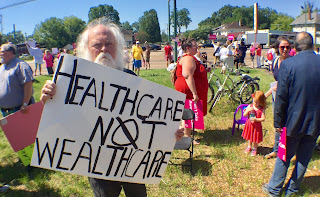Celebrating the Legacy of Sandi Klink: MCIL’s Heart and Executive Director Retires
After an incredible 25 years of dedicated service to the Memphis Center for Independent Living, now Disability CONNECTION Midsouth, Executive Director Sandi Klink is retiring. Her leadership has shaped the organization into a cornerstone of the Memphis disability community, advocating for independence, accessibility, and equal rights for people with disabilities. As she steps down, her legacy of activism, compassion, and perseverance leaves an indelible mark on the city and beyond.
For 25 years, Sandi Klink has been the heart of MCIL, leading the organization with a pragmatic Southern charm and an unyielding passion for justice. Known for her no-nonsense approach and ability to get things done, Sandi wasn’t just the Executive Director—she was a listener, an advocate, and a problem-solver who always placed the needs of the disability community first. Whether negotiating funding or tackling public transit, Sandi’s leadership was guided by a vision of independence for all. Sandi was the heart and soul of the organization.
Sandi and the Center have played a pivotal role in advocating for and improving curb ramps, accessible sidewalks, and paratransit services throughout the city. She personally with her direct style, yet soft approach has built and strengthened partnerships with local, state and national disability organizations, amplifying the voices of those with disabilities. She oversaw the Center’s reach into Fair Housing for people with disabilities so that our community was not left out. Mostly for thousands of Memphians with disabilities, she has enhanced independent living skills and peer support, creating long-term impact for the community. Often one person at a time.
One of Sandi’s most defining moments came during her behind-the-scenes support at the ADAPT actions. Sandi quietly delivered hundreds of hamburgers to sustain ADAPT activists all over the United States. During the long takeover of the Tennessee Governor’s office, she made sure that MCIL continued to run smoothly. She didn’t grandstand, but without her dedicated support, the work simply would not get done. The thing about her dedication and support behind-the-scenes is just that now it is hard to express just how thankful and helpful Sandi has been to us all.
Sandi’s influence has extended far beyond the walls of MCIL. Her tireless dedication has been felt throughout Memphis, across Tennessee and throughout the US where her quiet but effective activism ensured that people with disabilities had a voice in critical decisions. She was never one to seek the spotlight, but at the Statewide Independent Living Council and other necessary and glamourless jobs she took charge and did the important work.
From delivering meals to activists to advocating for better policies, Sandi’s work has touched countless lives. Her steady hand and fierce commitment have ensured that Disability CONNECTION Midsouth remains a beacon of support for the disability community.
We hope that Sandi does find time for some personal traveling—specifically, visiting New Orleans, a city known for its vibrant culture and history. Of course, we have her volunteering on too many projects now for her to leave. But, we hope that this marks a new chapter for a woman who has given so much of herself to the people of Memphis and beyond.
Though Sandi’s retirement marks the end of an era, her influence will be felt for years to come. Disability CONNECTION is poised to continue her work, building on the foundations she laid and continuing the fight for accessibility and independence. The organization’s future remains bright thanks to the tireless efforts and the values she instilled over her 25 years of leadership.
Thank You, Sandi!
As we bid farewell to Sandi Klink in her role as Executive Director, we offer our deepest gratitude for her 25 years of service. Her leadership, compassion, and vision have shaped Disability CONNECTION and the people today and over the past 25 years. Sandi’s legacy of advocacy will continue to inspire the work we do, and we wish her all the best as she embarks on her next adventure.

.jpg)
.jpg)
.jpg)


























